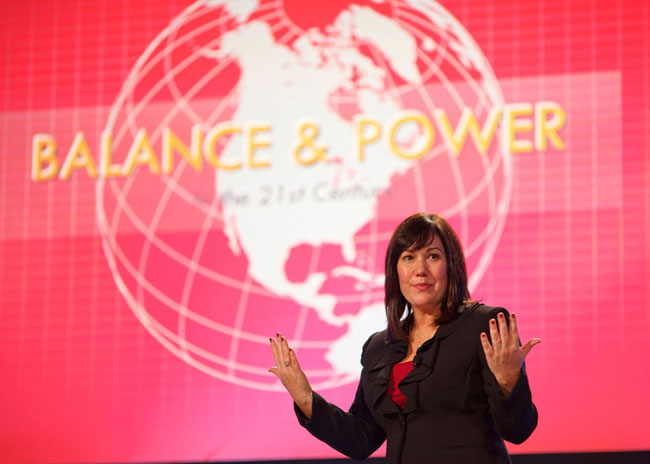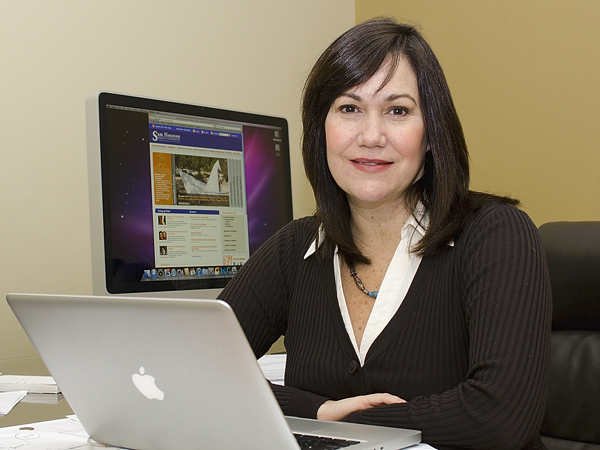Dan Rather Chair Works To Empower Women, Create 'Game-Changers' Around The World
Feb. 28, 2012
SHSU Media Contact: Meredith Mohr
 |
| Dan Rather Endowed Chair of journalism Kelli Arena travels all over the world lecturing and giving workshops to disenfranchised women, showing them strategies to be "game-changers" in their countries. —Submitted photo |
By day, she is a journalist, and by night, a mom.
While her children are at school, Kelli Arena, who serves as the Dan Rather Endowed Chair at Sam Houston State University, corresponds with the media on the recent turmoil in Egypt and the Middle East and works as president of her company RKC Solutions.
The two jobs demand constant time and commitment. But it’s something that she has worked hard to establish for herself—a precedent she spent many years building as she, in her words, “always tried to take both jobs, mom and journalist, very seriously.”
Since her days as a reporter at CNN, Arena has been working on many projects that have emphasized causes she is passionate about; like training women in the media in developing countries, among others. She has traveled around the world and been on the frontlines of history.
She has worked with youth, journalists and women from Yemen, Saudi Arabia, Oman, Bahrain, Lebanon, Libya, Tunisia, Morocco, Algeria and Jordan as part of the Young Women’s Leadership Academy and other training programs for communications strategies. Part of her work in these countries involved using her background as a journalist in a society where a free press exists to help teach ethical, effective journalism in countries where there has never been a free press before.
Last fall, Arena traveled to Egypt to work with women on basic writing and communications techniques and how to present themselves effectively as they appear in public as future leaders of economic and social change.
This is especially important in light of the uprising in the Middle East, she said, as many of the citizen-journalists she trained, women included, were out on the streets protesting.
“I didn’t want them to just be placeholders,” Arena said. “I wanted them to be game-changers.”
She recently signed on with the International Women's Forum to develop and moderate executive development roundtables, which will provide women with an opportunity to learn from senior global leaders and advance their competitiveness. IWF conducts leadership training around the world.
Arena said that her role as a mom has given her a new perspective on the projects she takes on, such as with a company she helped launch, News Certified Exchange. It is a firm that established a database of experts for journalists in hopes of diversifying the voices the public hears from on important matters. While she worked there, Arena’s focus was to help populate the database with female experts.
“Less than a quarter of the experts quoted in the media are female,” Arena said. “I believe women have important things to say and news consumers should hear it.”
Her work with NCE is especially poignant in light of her work on communications technique with women in the Middle East and North Africa. In these projects, she said she saw how important it is for women to be equals in the media and admired their commitment to issues that directly affect their families.
“These are strong, intelligent, and opinionated women who want to make a difference in their country,” Arena said. “They are willing to die for what they believe in. These are women who want to the world to be better for them and their children.”
 |
| Arena came to SHSU in 2009 as Dan Rather Chair after leaving her position as justice department/Supreme Court correspondent for the CNN news network. —Photo by Brian Blalock |
After more than two decades with CNN, for which she covered many of the biggest news stories of her time, Arena said she refuses to be a “has-been” and strives to be a driving force in the media world. As she puts it, she is still “involved in big stories; this time as a participant.”
“Clearly the more of the world you see, the better you are able to put into perspective things for your viewer,” Arena said. “You can’t cover the news from the newsroom. You have to be out there, talking to people, getting the stories, understanding what they’re up against. Being willing to push yourself and get out in the story is vital, because it gives your stories that necessary depth.”
It’s a lesson she learned in the early days of CNN.
Working as an intern and later joining the network as a business and economics reporter in the early years of its existence, Arena remembers getting a thorough education in the newsroom by doing every job in it – everything from booker to writer to producer.
She eventually ended up in news management, where her career started to take a completely different turn. It would lead her to some of the biggest stories and assignments of her career.
“I went into journalism to tell stories, but yet here I was, managing people and running the organization of the newsroom and I started to wonder if I was in the right thing,” Arena said. “As I was very seriously considering doing something completely different, I got an offer to go on air.”
She moved to London, then Tokyo, then back to New York and eventually to Washington, D.C. In 2001, CNN offered her a new position covering the Justice Department. During this time, Arena covered the Sept. 11 attacks.
Terrorism kept her busy for nearly a decade and eventually brought her to Guantanamo Bay, Cuba, where she was a part of the first group of journalists allowed by the government to attend the hearings of the members of the Al-qaeda in custody there.
“I was a part of a group of press that was getting a first glimpse at some of the main guys in the Sept. 11 attacks,” Arena said. “Everyone knew about them but we had never gotten to actually see them. We were escorted in and out by the military. It’s one thing to write about it —it’s another thing to see it, to meet the people who work there, to smell it. Not only was it a great honor to be the eyes and ears of the American public, but it completely changes your perspective.”
Arena laughs remembering that even while working 15-hour days as an on-air correspondent, a difficult job, big stories followed her.
“It was kind of a joke around the newsroom, that every time I was sent on an assignment some place, there was some major catastrophe or emergency that would inevitably follow,” Arena said. “My introduction to federal law enforcement as the justice correspondent was the huge ordeal surrounding the arrest of the FBI spy Robert Hansen.”
As an economics reporter, she was in London when the Financial Center was bombed. In Tokyo, she found herself in the middle of the Sarin gas attacks.
“A few times I have just skirted disaster,” Arena said. “I was riding the subway in Tokyo one morning while I was assigned as a correspondent there. A few minutes later, after I got off, the same train system was hit with Sarin gas in a chemical attack. I remember being in the middle of it all, getting to cover it as it happened.”
Perhaps the familiar rush of adrenaline is why she is drawn to the Middle East and North Africa, although now she is part of something more than just reporting what is happening. She is part of the change, as she said she is “planting the seed of democracy.”
A world away from Egypt, Arena said she finds her students and children continuously help her stay “a student of the world.”
Their inquisitiveness, their drive, even their understanding of technology and how that changes the way they communicate – She said she is constantly learning from them: the process of growth for her never ends.
“I’m learning from my students and children all the time,” Arena said. “I still don’t know what I want to be when I grow up, but right now I’m having a whole lot of fun figuring it out.”
These days, she is a mom, a wife, an expert, a teacher at SHSU since 2009, a contributor to CNN and, sometimes, she jokes, a chauffeur. In the midst of what she describes as “occasional chaos,” she has also taken the name of SHSU and run with it.
“The campus has a fresh energy,” Arena said. “I feel that SHSU is truly poised to be taken to a new level, and I’d very much like to be a part of that.”
- END -
This page maintained by SHSU's Communications Office
Associate Director: Julia May
Manager: Jennifer Gauntt
Located in the 115 Administration Building
Telephone: 936.294.1836; Fax: 936.294.1834
Please send comments, corrections, news tips to Today@Sam.edu.

 SamWeb
SamWeb My Sam
My Sam E-mail
E-mail

